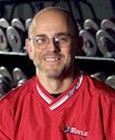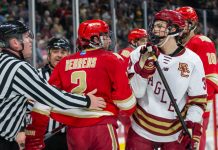For Boston University students, summertime is a time to rejoice. It’s a time of doing nothing on the beach, porch or couch. It’s a time of “No more teachers, no more books, blah, blah, blah” and “Mom, can I borrow the car (and $20)?”
And for the drained (bank accounts and bodies of the) academic denizens of lower Commonwealth Avenue it’s a time of serious R&R.
Even those students who stay on campus the months of June, July and August (and, let’s face it, pretend) to take summer classes will probably remember roof decks, fireworks on the Esplanade and the sounds of Sweet Caroline cascading over the Green Monster at Fenway a little easier than they recall the key points of their 8 a.m. lectures.
But that doesn’t apply to the fraternity of student athletes, and most particularly the Terriers hockey team, who spend their summer vacation working or, more specifically, working out.
However, you would think that past Terriers hockey teams might have had a bit more relaxing respite than the current players are enjoying at the moment.
You would think, wouldn’t you?
“Well, I think most of us still had part-time or summer jobs,” said a chuckling Mike Bavis of the minor difference between the Terriers teams of his playing era and today’s ice-bound BU students. “Not many of [the current] guys are doing that!”
Summer jobs aside, Bavis made it clear that Jack Parker’s prized athletes have always concentrated on keeping in shape and continuing the regimen designed by BU’s strength and conditioning guru, Mike Boyle.
“Obviously, the training has changed to some extent, but the commitment — the time commitment — and how important it is to our players to be physically prepared, it’s almost as if it is a given,” Bavis said.
Clearly, the former BU skater turned BU assistant coach turned Terriers associate head coach knows of what he speaks. On the ice, Bavis was a key member of four outstanding Boston University teams — he appeared in four NCAA tournaments, one national championship game and had a 123-43-15 record over four winters.
Bavis played both sides of the puck effectively and was voted New England’s top defensive forward in 1992 and 1993. He had a 34-48-82 line in 159 career games. Following three professional seasons and three years away from the rink, Bavis returned to Commonwealth Avenue in 1998-99 as an assistant coach.
“When you get back in September you are going to be as physically fit as you possibly can,” Bavis said of a BU player’s summer. “You’re going to have made positive gains, real positive gains, not just token gains in your condition. You’re going to be in a level of condition that we’ve established that we think we have to have across the board.”

And thanks to the man behind the “Body by Boyle” T-shirts seen in BU locker and weight rooms over the years, several generations of Terriers have made those strides. Boyle, of course, is a fixture within the Boston sports scene and has worked with the Bruins (NHL), Blazers (MLL), Celtics (NBA), Revolution (MLS) and Breakers (WUSA), and as the Terriers strength and conditioning guru he has presided over two NCAA championships.
Bavis pointed to the athletes’ commitment, in conjunction with Boyle’s programs, as an important building block for the Terriers’ success.
“I don’t know how much that’s changed over the last 20 years,” Bavis said. “Mike, as good as he is, he’s always evolving. I think our [workouts] have changed or our focus has changed from when I was doing it. But you probably have to go prior to me.”
Boston University is not the only school to employ such an intense program and you would be hard pressed to find any Division I program in the NCAA that does not employ a rigorous training system.
“The margin between us and other schools, in that area, has probably drawn closer because other teams have become, [not only] aware of our success, but certainly aware of how important that area is in championship success,” Bavis said. “But that doesn’t make it … any less a part of our success.”
Already one of the most storied programs in college hockey, the Terriers added a fifth national championship last season. Even so, Bavis and the coaching staff understand the unique problem they will encounter as the Terriers return to school.
“April 20, we were already training for [next season],” Bavis said. “And I know that it was said by Mike Boyle and it was said by Jack Parker that we’re no longer national champions.
“We’re defending national champions.”
After all, what do you want to do when you win it all? Well, basically, you want to win it all again.
BU repeated as champions in 1971 and 1972, but did not in 1978 in 1995. This season, the Terriers will look to follow the example of the ’70s skaters.
“People whose seasons had ended earlier than ours had already refocused their energies on getting a chance to do what we did this year,” Bavis said. “We won it this year and Boston College won it the year before. Michigan State won it the year before that. There are a lot of teams that won it once.
“Something that is very hard to control from a coaching standpoint is human nature. Human nature is a very powerful thing.
“Hopefully we’ve got guys on our team that their nature is to win and win again and win again. There are people out there that feed off the need, not the want, to keep winning. And we believe have guys in our leadership who have the ability to bring that to the rink every day.
Every day — even during the summer.
“Having said that, I think our goal as coaches is to keep their focus on the fact that the only way that this team is ‘one for the ages’ [will depend] on if we can do what the ’71 and ’72 Terrier teams did, or, again, what the Minnesota or the Denver teams did.
“So, we’re very aware as coaches and we’re working very hard at that.”
And so, no doubt, are the members of the Boston University hockey team.


